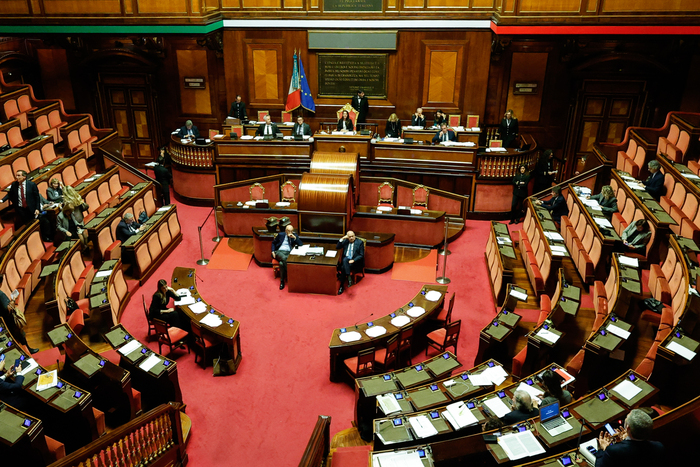The Government slides through Congress like a tightrope walker, always in danger of falling into the void and always - for now - with some saving resource to maintain its balance.
In the worst moment of the legislature for the elastic parliamentary majority that has been supporting the Executive, this managed to carry out this Thursday four legislative norms and another promoted by the PSOE.
The most relevant of them, the reform of the National Security Law, passed the first procedure with the rejection of the usual allies and the indirect support of the opposition.
ERC did not support any of the five initiatives.
The PP is convinced that, deep down, the government wanted to be defeated in its attempt to add some new aspects to two articles of the National Security Law.
“They would be delighted that it would decline, because that way they would make the ERC happy,” ventured the popular deputy Juan Antonio Callejas before the ironic smile of the Minister of the Presidency, Félix Bolaños.
Esquerra had presented, before the outbreak of
the Pegasus case
, an amendment to bring down the project.
And it was supported by all the Catalan separatists and usual allies of the Executive such as PNV, EH Bildu and Más País, united, in most cases, by the argument that the reform invades regional powers.
The PP did not succumb to the temptation to join such a company to inflict a defeat on the Government.
Vox and Ciudadanos did the same.
The popular ones recorded their substantive discrepancies, especially with the most controversial of the reform clauses, the one that allows temporarily requisitioning assets and mobilizing any citizen of legal age in the event of declaring a state of crisis.
“They can confiscate your assets,” protested Callejas, “and force you to make a benefit without any compensation, all at the mercy of a president.
And what a president!”
So he warned: "This is not a blank check."
Those of Vox and Ciudadanos were rather black checks: both said that they are not willing to agree on anything on national security with a government that "hands over official secrets to those who want to destroy the State",
On another of the main aspects of the reform, the creation of a strategic reserve of materials to prevent shortages in the event of a crisis, as happened at the beginning of the pandemic, no one objected.
This was what Bolaños stressed the most in his presentation of the initiative.
“States learn from crises and our duty is to take that learning into law,” he defended.
In truth, little was discussed about the content of the law.
The loudest sector of the independence movement returned to the fray with espionage.
“No matter how much you put the law in your mouth, you are not a democratic state,” CUP deputy Mireia Vehí launched at Bolaños.
The Junts spokeswoman, Míriam Nogueras, once again concluded her speech in the way she has been accustomed for days, with a “
visca Catalunya lliure!
”.
On the other side, Ciudadanos drew applause from Vox and, for this match, Javier Ortega Smith warned the "enemies of Spain": "We are going to investigate them, we are going to sit them on the bench and we are going to outlaw them."
In the popular caucus, much was celebrated when its deputy Ana Belén Vázquez exclaimed: "I hope they spy on them more!"
What happened with the national security reform was repeated in similar terms with another of the laws, the one that regulates the use of materials that can be used to make explosives.
ERC had also presented an amendment to the entirety for a long time and again on the main argument that it excludes the regional police forces.
This time some supporters fell away, such as EH Bildu and Más País, who abstained.
Not so the PNV, which realigned itself with Esquerra.
Government and opposition voted together again.
None of the legislative initiatives of the Government and the PSOE had the support of the ERC.
Sources from that group insisted on disassociating him from the espionage scandal.
"Without Pegasus, we would have voted the same in all cases," they assured.
The independentistas were the only ones who opposed the law that establishes tax exemptions for housing rehabilitation, after an amendment of theirs was rejected.
There the Government suffered a small defeat, because Ferran Bel, of the PDeCAT, managed to get an amendment thanks to the support of the PP.
ERC abstained from the decree with measures to block properties of figureheads of Russian oligarchs, a norm whose legal certainty was discussed by other groups, including United We Can, despite its favorable vote.
And Republicans opposed a Socialists bill to temporarily include the fact that the victim is a refugee from the Ukrainian war among the aggravating circumstances for the crime of human trafficking.
This initiative had a very high approval ―308 votes―, although a good part of the Chamber has already warned that it will demand substantial changes so as not to discriminate against people fleeing other armed conflicts.

/cloudfront-eu-central-1.images.arcpublishing.com/prisa/EOXDW6O4YNTNWXLQC2SB3JCRKY.jpg)


/cloudfront-eu-central-1.images.arcpublishing.com/prisa/OTWB63YVDRNKAQLEH7S4FTFBNI.jpg)



